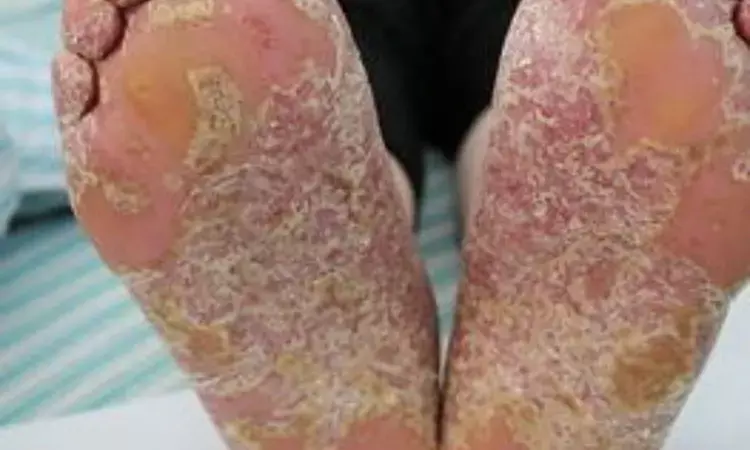- Home
- Medical news & Guidelines
- Anesthesiology
- Cardiology and CTVS
- Critical Care
- Dentistry
- Dermatology
- Diabetes and Endocrinology
- ENT
- Gastroenterology
- Medicine
- Nephrology
- Neurology
- Obstretics-Gynaecology
- Oncology
- Ophthalmology
- Orthopaedics
- Pediatrics-Neonatology
- Psychiatry
- Pulmonology
- Radiology
- Surgery
- Urology
- Laboratory Medicine
- Diet
- Nursing
- Paramedical
- Physiotherapy
- Health news
- Fact Check
- Bone Health Fact Check
- Brain Health Fact Check
- Cancer Related Fact Check
- Child Care Fact Check
- Dental and oral health fact check
- Diabetes and metabolic health fact check
- Diet and Nutrition Fact Check
- Eye and ENT Care Fact Check
- Fitness fact check
- Gut health fact check
- Heart health fact check
- Kidney health fact check
- Medical education fact check
- Men's health fact check
- Respiratory fact check
- Skin and hair care fact check
- Vaccine and Immunization fact check
- Women's health fact check
- AYUSH
- State News
- Andaman and Nicobar Islands
- Andhra Pradesh
- Arunachal Pradesh
- Assam
- Bihar
- Chandigarh
- Chattisgarh
- Dadra and Nagar Haveli
- Daman and Diu
- Delhi
- Goa
- Gujarat
- Haryana
- Himachal Pradesh
- Jammu & Kashmir
- Jharkhand
- Karnataka
- Kerala
- Ladakh
- Lakshadweep
- Madhya Pradesh
- Maharashtra
- Manipur
- Meghalaya
- Mizoram
- Nagaland
- Odisha
- Puducherry
- Punjab
- Rajasthan
- Sikkim
- Tamil Nadu
- Telangana
- Tripura
- Uttar Pradesh
- Uttrakhand
- West Bengal
- Medical Education
- Industry
Groundbreaking Treatment for Palmoplantar Pustulosis: 308-nm Excimer Light Shows Promise, Study Reveals

Japan: In a breakthrough revelation, a recent study published in The Journal of Dermatology has demonstrated the efficacy of 308-nm excimer light therapy in treating palmoplantar pustulosis (PPP), irrespective of the presence or absence of focal infection. The real-world experience conducted at a single center sheds new light on managing a condition that has long posed challenges to dermatologists and patients alike.
"Treatment with 308-nm excimer light is effective in palmoplantar pustulosis patients," the researchers wrote. Patients who quit smoking were responsive to any treatment, suggesting the importance of smoking cessation.
Palmoplantar pustulosis (PPP), characterized by pustule formation on the palms and soles, is relatively rare, and recognition of PPP is different in different countries. Therefore, real-world data are limited. Local phototherapy for the palms and the soles is commonly used for PPP treatment owing to tolerable safety. However, data is limited on the effectiveness of 308-nm excimer light.
To fill this knowledge gap, Yoshiko Niimura, Department of Dermatology, Teikyo University School of Medicine, Tokyo, Japan, and colleagues aimed to retrospectively investigate the effectiveness of treatments for PPP, especially phototherapy (308-nm excimer light), in their department. In addition, they also examined whether focal infection and smoking status affected responsiveness to treatment of PPP.
The researchers analyzed patients diagnosed with palmoplantar pustulosis by board-certified dermatologists and visited the hospital from 2015 to 2018. Data on the PPP area severity index (PPPASI) before treatment was collected. They also collected data on PPPASI from May to August 2018 as “after treatment” from all patients.
Patients who received any treatment for less than three months were excluded. The study included nineteen patients (16 women and three men).
The study revealed the following findings:
- In patients treated with phototherapy (n = 12), PPPASI significantly decreased from a mean ± SD of 16.5 ± 10.3 to 4.5 ± 3.6, whereas it did not in patients treated without phototherapy (n = 7).
- Patients who quit smoking showed a significant decrease in PPPASI after treatment (16.8 ± 12.7 to 2.4 ± 2.9).
- Regarding focal infection, in patients treated without phototherapy, the reduction rate of PPPASI was significantly lower in patients with focal infection than in those without focal infection (17.7 ± 21.5%, 71.1 ± 19.3%), indicating that focal infection is associated with intractability.
- In patients treated with phototherapy, PPPASI decreased regardless of the presence or absence of focal infection.
As dermatologists and researchers continue to explore innovative treatment modalities, the findings of this study serve as a beacon of hope for those affected by palmoplantar pustulosis. With 308-nm excimer light therapy emerging as a promising avenue for managing this challenging condition, the future is promising for improved quality of life and enhanced therapeutic outcomes for patients worldwide.
Reference:
Niimura, Y., Kamata, M., Ishikawa, T., Nagata, M., Ito, M., Watanabe, A., Egawa, S., Uchida, H., Hiura, A., Fukaya, S., Hayashi, K., Fukuyasu, A., Tanaka, T., & Tada, Y. 308-nm excimer light is effective for palmoplantar pustulosis regardless of the presence or absence of focal infection: Single-center real-world experience of treatment for palmoplantar pustulosis. The Journal of Dermatology. https://doi.org/10.1111/1346-8138.17191
Dr Kamal Kant Kohli-MBBS, DTCD- a chest specialist with more than 30 years of practice and a flair for writing clinical articles, Dr Kamal Kant Kohli joined Medical Dialogues as a Chief Editor of Medical News. Besides writing articles, as an editor, he proofreads and verifies all the medical content published on Medical Dialogues including those coming from journals, studies,medical conferences,guidelines etc. Email: drkohli@medicaldialogues.in. Contact no. 011-43720751


